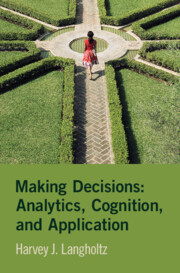Book contents
- Making Decisions: Analytics, Cognition, and Application
- Making Decisions: Analytics, Cognition, and Application
- Copyright page
- Dedication
- Contents
- Figures
- Tables
- Preface
- Acknowledgments
- Copyright Acknowledgements
- Part I Analytics: Probability, Evaluation, Decision Trees, and Strategies for Decision Making
- Introduction to Part II: Cognitive Processes of Decision Making
- 5 Heuristics: Assumptions and Quick Rules of Thumb We All Use, But Maybe Shouldn’t
- 6 Prospect Theory: Psychological Aspects beyond Expected Value
- 7 Two Systems: A Descriptive Model That Explains How People Make Decisions
- 8 Decisions Are Made Based on Our Memories, But How Reliable Are Our Memories?
- 9 Psychology + Economics = Behavioral Economics = Ways to (Gently) Influence Decisions
- Part III Applications, Examples, and Selected Topics
- References
- Index
- References
9 - Psychology + Economics = Behavioral Economics = Ways to (Gently) Influence Decisions
from Introduction to Part II: Cognitive Processes of Decision Making
Published online by Cambridge University Press: 23 October 2025
- Making Decisions: Analytics, Cognition, and Application
- Making Decisions: Analytics, Cognition, and Application
- Copyright page
- Dedication
- Contents
- Figures
- Tables
- Preface
- Acknowledgments
- Copyright Acknowledgements
- Part I Analytics: Probability, Evaluation, Decision Trees, and Strategies for Decision Making
- Introduction to Part II: Cognitive Processes of Decision Making
- 5 Heuristics: Assumptions and Quick Rules of Thumb We All Use, But Maybe Shouldn’t
- 6 Prospect Theory: Psychological Aspects beyond Expected Value
- 7 Two Systems: A Descriptive Model That Explains How People Make Decisions
- 8 Decisions Are Made Based on Our Memories, But How Reliable Are Our Memories?
- 9 Psychology + Economics = Behavioral Economics = Ways to (Gently) Influence Decisions
- Part III Applications, Examples, and Selected Topics
- References
- Index
- References
Summary
During the closing years of the twentieth century, research psychologists and economists came to recognize the synergies and overlaps between the two disciplines. The field of behavioral economics provides descriptive explanations of why people behave as they do, and also tools and techniques that are now widely adopted for influencing the decisions individuals make. In their 2009 book Nudge: Improving decisions about health, wealth, and happiness, Richard Thaler and Cass Sunstein proposed libertarian paternalism, whereby institutions could gently guide people in their decision making. They introduced the concept of choice architecture whereby the decisions people face could be designed and structured so individuals retained control but can easily make decisions that benefit themselves and society. Examples include selection of healthful foods, encouraging organ donation, early planning for retirement savings, and others.
Keywords
Information
- Type
- Chapter
- Information
- Making Decisions: Analytics, Cognition, and Application , pp. 110 - 124Publisher: Cambridge University PressPrint publication year: 2025
References
Recommended Readings
Accessibility standard: WCAG 2.0 A
Why this information is here
This section outlines the accessibility features of this content - including support for screen readers, full keyboard navigation and high-contrast display options. This may not be relevant for you.Accessibility Information
Content Navigation
Allows you to navigate directly to chapters, sections, or non‐text items through a linked table of contents, reducing the need for extensive scrolling.
Provides an interactive index, letting you go straight to where a term or subject appears in the text without manual searching.
Reading Order & Textual Equivalents
You will encounter all content (including footnotes, captions, etc.) in a clear, sequential flow, making it easier to follow with assistive tools like screen readers.
You get concise descriptions (for images, charts, or media clips), ensuring you do not miss crucial information when visual or audio elements are not accessible.
You get more than just short alt text: you have comprehensive text equivalents, transcripts, captions, or audio descriptions for substantial non‐text content, which is especially helpful for complex visuals or multimedia.
Visual Accessibility
You will still understand key ideas or prompts without relying solely on colour, which is especially helpful if you have colour vision deficiencies.
Structural and Technical Features
You gain clarity from ARIA (Accessible Rich Internet Applications) roles and attributes, as they help assistive technologies interpret how each part of the content functions.
